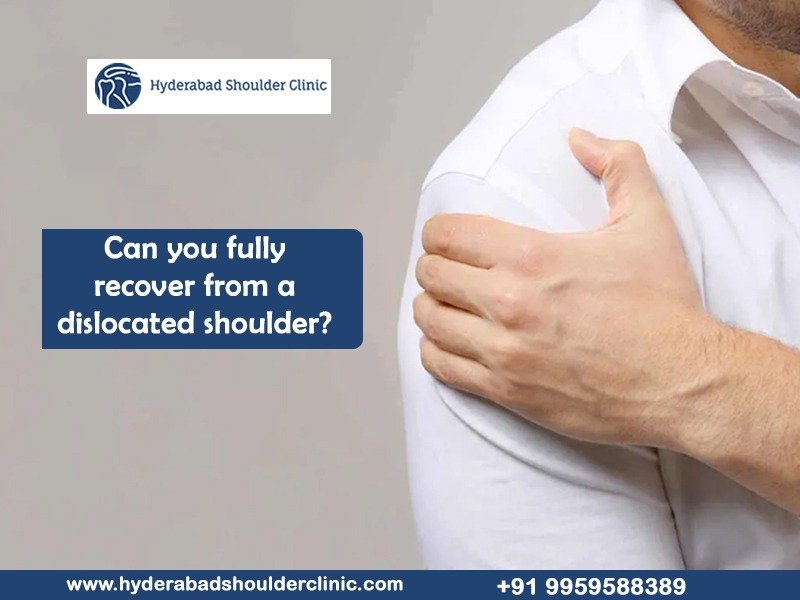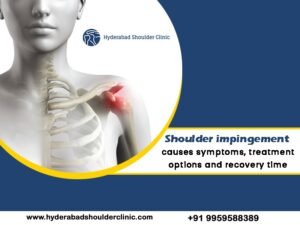A dislocated shoulder can happen from a sports injury or accident, such as a fall. The patient’s top of the arm bone will pop out of the shoulder socket. A patient with a dislocated shoulder would have likely injured (stretched or torn) some of the muscles, tendons (tissues that connect muscle to bone), or ligaments (tissues that connect bone to bone) of the shoulder joint. All these tissues help keep your arm in place. A dislocated shoulder is very painful, and it also restricts movement. The patient also experiences swelling and bruising to the shoulder along with numbness, tingling, or weakness in the arm, hand, or fingers.
Immediate action after a shoulder dislocation

Please do not try to pop your arm back in yourself since you could severely damage the tissues, nerves and blood vessels around the shoulder joint. If you observe the symptoms mentioned above, visit the nearest emergency room. During the waiting period, avoid moving your upper arm as much as possible.
Please take the help of someone who can make a simple sling to hold your lower arm across your chest. The elbow must be bent at a right angle.
In most cases, the doctors in the emergency room will place the back (relocated or reduced) into your shoulder socket. Not every dislocation requires surgery. The decision is based on the patient’s age and any previous dislocations. Surgery is preferred for those whose professional life is dependent on their shoulder.
Medication is given to relax your muscles and block your pain. The shoulder is immobilized for it to heal properly.
Follow the below steps to reduce swelling:
- Put an ice pack on the injured area immediately after the injury.
- Immobilize your shoulder and maintain the arm close to the body.
- Remove any finger rings until your doctor tells you it is safe.
Use medication to reduce pain. Pain medications must be used with caution if you have heart disease, high blood pressure, kidney disease, or have had stomach ulcers or internal bleeding in the past.
Recovery from a dislocated shoulder
One has to wait for 12 and 16 weeks for the dislocated shoulder to heal after it has been put back into place. After a few days, You can stop wearing the sling.
Take leave for 2 to 4 weeks from your work. The duration depends on the nature of the work. Hence, it’s best to discuss this with your care team.
Below are steps one can take to achieve full recovery from a dislocated shoulder:
Physical Therapy: To achieve full recovery from shoulder surgery, one has to do 2 to 4 weeks of physical therapy.
The main focus will be on stretching the shoulder. Shoulder stretches will make sure that you have good shoulder movement.
Later, you move to strength exercises for your shoulder muscles and ligaments.
The main benefits of exercise at the appropriate time are:
- Reduce Stiffness
- Relieve Some Of The Pain
- Build Up Strength In Your Shoulder Muscles
It’s common to feel some aching, discomfort or stretching when doing these exercises. But if these symptoms persist for more than 30 minutes, exercise less forcefully and less often.

Return to normalcy: Most activities can be reduced within 2 weeks, but heavy lifting and sports involving the shoulder should be avoided for 6 weeks and 3 months. Do not return to activities that place too much stress on your shoulder joint without checking with your doctor. Activities like sports, gardening, heavy lifting, or even reaching above shoulder level should be avoided. If you make movements which require reaching with your arm to the side and rotating to the back, the shoulder becomes unstable.
Follow-ups: Follow-up is crucial within a week or less after your shoulder joint is put back into place. Expert shoulder surgeons at Hyderabad Shoulder Clinic will check your shoulder’s bones, muscles, tendons, and ligaments.
Visit to the doctor: Apart from your regular follow-ups, please consult a doctor if:
- If the swelling or pain in your shoulder, arm, or hand is increasing day by day.
- Colour change of arm or hand (they might turn purple)
- Fever
Chances of recurrence are high as with each injury. It takes less force to dislocate the shoulder. Recurrent dislocations would require surgery to repair or tighten the ligaments that hold the bones in your shoulder joint together. The first dislocation will heal nicely, but it gives way to future dislocations. Recurrence depends on age and how well the healing happened the first time. Depending on the extent of injury to the surrounding tissues, surgery might be better after the dislocated shoulder is put back in place. The risk of recurrence is high in people younger than 25 and those over 40. But one can reduce the risk by continuing the recovery exercises under the supervision of a physiotherapist and avoiding awkward arm positions.
Dr Chandra Sekhar is the best shoulder specialist. He has worked with many sports personnel and helped them in their path towards recovery from shoulder injuries. At Hyderabad Shoulder Clinic, we give equal importance to the post-surgical or post-treatment period. We educate the patient on all post-healing care. Please visit our website https://hyderabadshoulderclinic.com/ or contact us at +91 9959588389, shoulderandsportsclinic@gmail.com.





